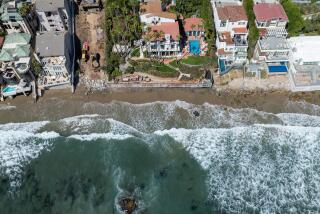State panel targets plastic trash at beaches
Disgusted by pictures of trash-strewn coasts, the California Ocean Protection Council on Thursday called for an aggressive crackdown on plastic fast-food containers, a ban of those containing toxic chemicals and a program to reimburse police for vigorous enforcement of littering laws.
Lt. Gov. John Garamendi, a member of the council, also instructed the staff to find money to deploy “nurdle” police to prosecute plastic manufacturers that allow plastic pellets to spill off industrial lots.
The tiny pellets, nicknamed nurdles, are the most prevalent plastic trash found in coastal waters and the state’s beaches. The council plans to work with local law enforcement officers, state legislators and agency directors to turn its recommendations into laws and regulations.
The governor’s Ocean Protection Council was founded two years ago to set the state’s overall ocean policy and coordinate the actions of dozens of disjointed agencies.
The voters gave the council $90 million by passing Proposition 84 in November, supporting Gov. Arnold Schwarzenegger’s interest in protecting a body of water that generates an estimated $46 billion from coastal tourism in California and other ocean-related industries.
Thursday’s action came as a surprise when the three-member council amended a less ambitious staff-prepared plan with a set of 10 resolutions written by the nonprofit Santa Monica-based environmental group Heal the Bay. The resolutions sought to reduce beach trash and marine debris and encourage fast-food restaurants to switch from plastic to biodegradable materials.
“This is a complete reversal,” said Tim Shestek, Western regional director of the American Chemistry Council, which represents companies that turn petroleum into plastics. He suggested it was not an appropriate way for the council to set public policy. “It hasn’t been reviewed by the business community.”
Moreover, Shestek said he was disturbed by the council’s focus on plastics. If restaurants switch to cardboard or other materials for take-out containers, he contended, they also can end up on the beach or in the water.
The daylong meeting included testimony from state officials, environmental representatives and scientific experts about how plastics are extremely slow to degrade in the marine environment. Discarded plastic fishing gear and other plastic marine debris kill more than 1 million seabirds and 100,000 marine mammals and sea turtles every year, as well as sullying coastlines worldwide.
At one point during the meeting, a council staff member left the staff table to take the microphone during public comment to complain that her favorite Northern California beach was being “carpeted” with plastic trash after rainstorms.
The tenor of the meeting was set by Garamendi, who showed little patience with industry suggestions that more study was needed, calling it “paralysis by analysis.”
Garamendi urged the adoption of all of Heal the Bay’s recommendations, a motion ultimately supported by the two other council members, state Resources Secretary Mike Chrisman and California EPA Secretary Linda Adams.
Under direction from the council, state workers have until December to prepare a plan to phase out the most toxic and damaging types of plastic packaging by 2015. In addition to curtailing the use of Styrofoam cups and other items, the plan would target plastics that can “leak” chemicals, such as cancer-causing vinyl chloride and bisphenol-A, which is linked to prostate cancer in humans and reproductive problems in wildlife.
*
ken.weiss@latimes.com
More to Read
Sign up for Essential California
The most important California stories and recommendations in your inbox every morning.
You may occasionally receive promotional content from the Los Angeles Times.










